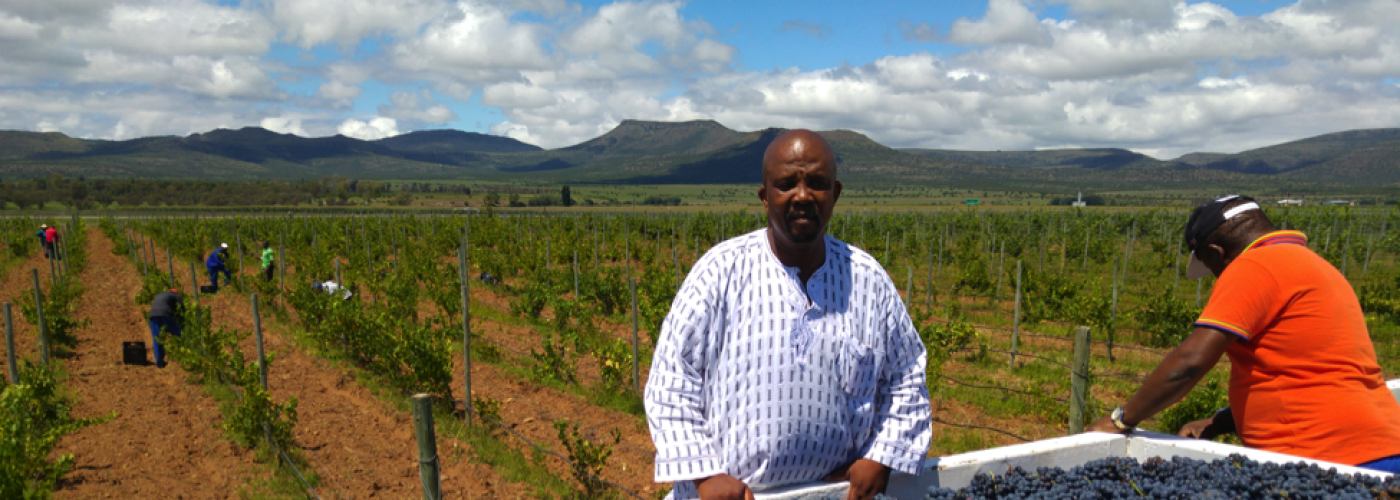Joint Venture With Private Investor Helps Cooperative Achieve Sustainable Growth
Image

This is the third post in the Cooperative Development Learning Series, which highlights learning from USAID’s Cooperative Development Project. See the previous posts here and here.
Whittlesea, South Africa. — A new kind of public-private partnership has emerged as an unintended outcome of the USAID-supported Cooperative Development Program (CDP) implemented by Cooperative Resources International (CRI). The aim of the project was to transform household level producers and their cooperatives into profitable firms. Although cooperatives were making progress in terms of governance and business management, one core ingredient for commercialization was still missing: Access to financing was virtually non-existent to the nascent producers in South Africa.
As in much of Africa, all land in the former South African homelands is communally owned. Commercial banks largely refuse to provide credit without a title to the land to collateralize the borrowing. It presents a paradox: South Africa wants to promote agricultural development, but without financing, commercializing smallholder farming cannot be accomplished. Yet, commercialization is key to economically transforming farming operations into sustainable enterprises not dependent on governmental support.
Enter Lieb Venter, an agricultural economist who independently formed FarmInvest to take a minority or equal investment in several of the cooperatives with his own resources. While the co-ops were growing under the assistance of CRI’s CDP, he saw that not all the needs could be fulfilled through the capacity-building activities. He says that a joint venture is "the heart of the model for agriculture development in South Africa because it removes risk which, in turn, permits financial institutions to loan money." So far, FarmInvest has co-invested more than US$100,000 and expects to invest another US$150,000. As Venter points out, unlike other private equity investors, it's the cooperative’s company from the beginning.
“At the end of the day, once we go, the cooperative has a track record. Banks will lend to it. It has a market. It has input supplies. From the beginning, we put our manager in, and the cooperative puts a manager next to him. Without the Cooperative Development Program, however, investment would have stopped long ago because we would not have been familiar with the cooperative,” says Venter.
FarmInvest wants to help emerging agricultural cooperatives succeed on their own, without grants and donor assistance. Sure, Venter wants to make money, but his principle motivation is economic development for everyone, an outcome, he says, that will benefit farmers, cooperatives, social enterprises, and investors alike.
How It Works
One of FarmInvest’s joint ventures is a vineyard on land controlled by Mayime Agriculture Primary Cooperative, a novel shareholder-driven social enterprise that is South Africa's first-ever community-owned juice and wine vineyard. FarmInvest has a 45 percent equity stake, and the cooperative has a 55 percent stake. The period of the joint venture (JV) is 10 years, after which the cooperative has the option to buy out FarmInvest at the then-assessed value. In the intervening years, FarmInvest shares the profits and co-manages the farming operation with a local cooperative manager serving as a deputy, in effect learning the business. Commercial financing is secured through FarmInvest during the JV period, after which the emerging cooperative is expected to be able to secure bank financing on its own. When additional financing is required outside of South African government grants, loans, or bank lending, FarmInvest loans capital to the cooperative for its share of the JV at market rates, currently around 10.25 percent. While Mayime Cooperative is involved in a joint venture with FarmInvest, it maintains its autonomy and independence as a cooperative. It manages the joint venture as one of its business activities that brings benefits and income to its members. FarmInvest and Mayime jointly govern the JV.
The Vineyard Blooms
In late 2017, South Africa's Land Bank agreed to lend the JV US$800,000 (at market rates) to process, bottle, and label its own wine. This reduces production costs considerably by avoiding the need to pay a third-party to process the grapes into wine, thus providing more profits to the cooperative and more income to co-op members and their families. While still dependent on the government's help, the shift from grant to debt financing puts the cooperative on a clear path to operating commercially and independently of donor support.
In the three years since Mayime's 375 members established the wine grape enterprise — with USAID's assistance in creating the business plan, cooperative organization, and training — the vineyard is on track to expand from its original production of 5 hectares to 100 hectares, with a 100-ton winery to be built on the premises. Between 2016 and 2017, wine production grew from 3,800 bottles to 16,000 bottles, and new export sales agreements to China and the Netherlands are in the works, in addition to sales in the local marketplace. Likewise, in three years the permanent employment force has grown to 20 from zero with about 100 seasonal workers hired annually to pick grapes. Mayime's wine has won several top honors in the wine industry, further ensuring a pathway to success. The creation of a successful business has a ripple effect that expands the local economy where there was previously little opportunity, high unemployment, discontent, and conflict. Through the cooperative, the community largely feels an ownership in this business and sees the potential for an ongoing income not dependent on government.
The Bottom Line
The development-focused investment model that is evolving in South Africa reflects a new model that combines both community cooperative and business partner by means of joint ventures, one that is fundamental to the economic transformation of South African agriculture. It is business-driven, investment-driven and development-driven. Regardless of the economic activity, the anticipated outcomes are the same. Taking a serious business approach to development that attracts private investment — whether the local entrepreneur is an individual, cooperative, traditional business, or social enterprise — the result will lead to greater improvements in economic and social well-being far beyond the expectations of the project. It has a built-in exit strategy from donor aid, and it is sustainable.
Want more information? Details on South African joint ventures supported by Cooperative Resources International’s Cooperative Development Program can be found in the Case Study South Africa - Strengthening Cooperatives’ Bridge to Value Chains.
Cooperative Resources International (CRI) is a leading farm services firm specializing in providing improved dairy and beef genetics. Headquartered in Wisconsin and owned by some 16,000 member-producers, it exports 10 million units of semen annually to more than 60 countries. Since 2010, CRI has been an implementing partner of the USAID-funded Cooperative Development Program and carries out several activities in pre-commercial markets, aligning its commercial interests with development needs.


